Political developments in many parts of the world today call us to challenge the forces that thrive on fascism, racism, anti-genderism, and the collapse of humanities. The books on this list do just that: These ethnographies and studies of Europe, the United States, and Australia present multiple realities that contest white heteronormativity. The list consists of books that explore the intersections of race, gender, sex and class from multiple perspectives. These studies deconstruct heteronormative practices, analyse non-normative identity construction among communities of queer people and black mothers, and engage critically with social media in the process of identity construction. We have also included books that uncover new forms of solidarity and usages of intersectionality in feminist research.
How to proceed:
As we receive many requests for reviews, please send an email to reviews@allegralaboratory.net indicating which book you would like to review, your postal address, and 2-3 sentences explaining why you should be reviewing the book. Please explain how the book relates to your own research or interests. We will get back to you once we have selected the reviewers.
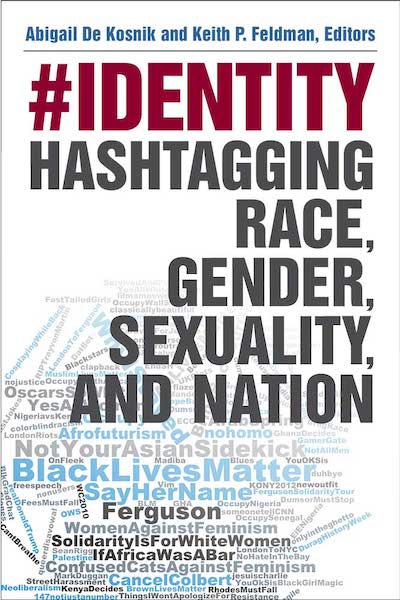 #identity: Hashtagging Race, Gender, Sexuality, and Nation. Abigail De Kosnik and Keith P. Feldman (eds.). University of Michigan Press.
#identity: Hashtagging Race, Gender, Sexuality, and Nation. Abigail De Kosnik and Keith P. Feldman (eds.). University of Michigan Press.
Since its launch in 2006, Twitter has served as a major platform for political performance, social justice activism, and large-scale public debates over race, ethnicity, gender, sexuality, and nationality. It has empowered minoritarian groups to organize protests, articulate often-underrepresented perspectives, and form community. It has also spread hashtags that have been used to bully and silence women, people of color, and LGBTQ people.
#identity is among the first scholarly books to address the positive and negative effects of Twitter on our contemporary world. Hailing from diverse scholarly fields, all contributors are affiliated with The Color of New Media, a scholarly collective based at the University of California, Berkeley. The Color of New Media explores the intersections of new media studies, critical race theory, gender and women’s studies, and postcolonial studies. The essays in #identity consider topics such as the social justice movements organized through #BlackLivesMatter, #Ferguson, and #SayHerName; the controversies around #WhyIStayed and #CancelColbert; Twitter use in India and Africa; the integration of hashtags such as #nohomo and #onfleek that have become part of everyday online vernacular; and other ways in which Twitter has been used by, for, and against women, people of color, LGBTQ, and Global South communities. Collectively, the essays in this volume offer a critically interdisciplinary view of how and why social media has been at the heart of US and global political discourse for over a decade.
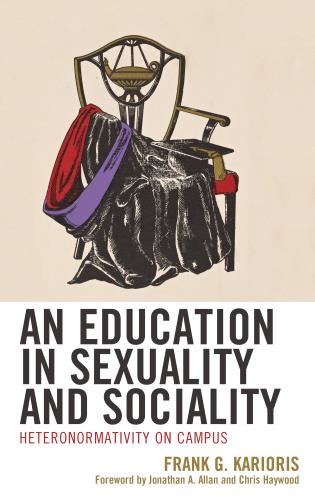 Frank G. Karioris. 2018. An Education in Sexuality and Sociality Heteronormativity on Campus. Rowman and Littlefield.
Frank G. Karioris. 2018. An Education in Sexuality and Sociality Heteronormativity on Campus. Rowman and Littlefield.
While hook-up culture on university campuses represents a part of the story, it is only part of the story. It is important to add to this and investigate the way the university itself brokers and seeks out specific forms of sexuality, sex, and connection amongst students. This book sheds light on how the university as an institution endorses certain forms of sociality, sexuality, and coupling, while excluding others. Building on extensive ethnographic fieldwork, this book furthers the discussion on the impact these institutional measures have on students, and how students work through and around them – while simultaneously establishing relations outside of and beyond hooking-up.
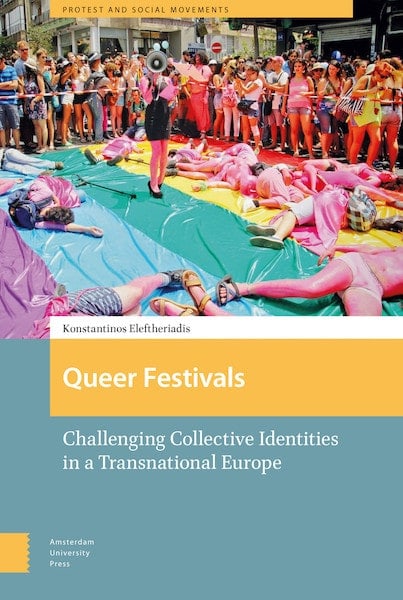 Konstantinos Eleftheriadis. 2018. Queer Festivals: Challenging Collective Identities in a Transnational Europe. Amsterdam University Press.
Konstantinos Eleftheriadis. 2018. Queer Festivals: Challenging Collective Identities in a Transnational Europe. Amsterdam University Press.
To what extent is queer anti-identitarian? And how is it experienced by activists at the European level? At queer festivals, activists, artists and participants come together to build new forms of sociability and practice their ideals through anti-binary and inclusive idioms of gender and sexuality. These ideals are moreover channelled through a series of organisational and cultural practices that aim at the emergence of queer as a collective identity. Through the study of festivals in Amsterdam, Berlin, Rome, Copenhagen, and Oslo, Queer Festivals: Challenging Collective Identities in a Transnational Europe thoughtfully analyses the role of activist practices in the building of collective identities for social movement studies as well as the role of festivals as significant repertoires of collective action and sites of identitarian explorations in contemporary Europe.
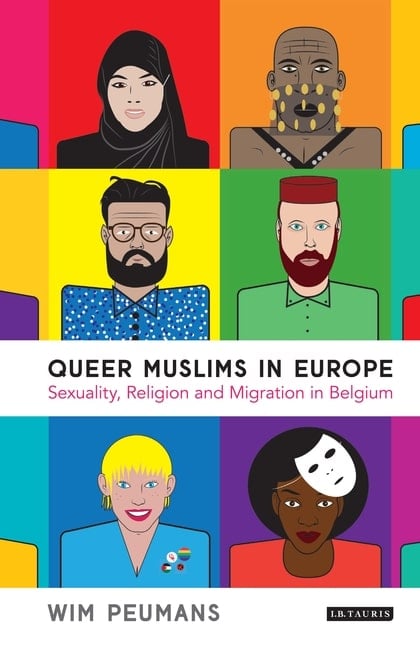 Wim Beumans. 2018. Queer Muslims in Europe: Sexuality, Religion and Migration in Belgium .I.B. Tauris.
Wim Beumans. 2018. Queer Muslims in Europe: Sexuality, Religion and Migration in Belgium .I.B. Tauris.
Belgium was the second country in the world to introduce same-sex marriage. It has an elaborate legal system for protecting the rights of LGBT individuals in general and LGBT asylum seekers in particular. At the same time, since 2015 the country has become known as the `jihadi centre of Europe’ and criticized for its `homonationalism’ where some queer subjects – such as ethnic, racial and religious minorities, or those with a migrant background – are excluded from the dominant discourse on LGBT rights. Queer Muslims living in the country exist in this complex context and their identities are often disregarded as implausible. This book foregrounds the lived experiences of queer Muslims who migrated to Belgium because of their sexuality and queer Muslims who are the children of economic migrants. Based on extensive fieldwork, Wim Peumans examines how these Muslims negotiate silence and disclosure around their sexuality and understand their religious beliefs. He also explores how the sexual identity of queer Muslims changes within a context of transnational migration. In focusing on people with different migration histories and ethnic backgrounds, this book challenges the heteronormativity of Migration Studies and reveals the interrelated issues involved in migration, sexuality and religion. The research will be valuable for those working on immigration, refugees, LGBT issues, public policy and contemporary Muslim studies.
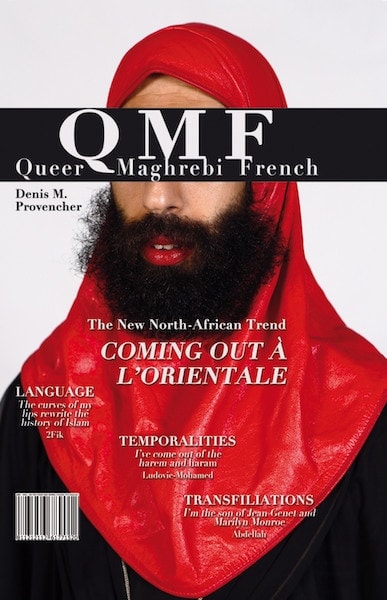 Provencher, Denis M. 2017. Queer Maghrebi French: Language, Temporalities, Transfiliations. Liverpool University Press.
Provencher, Denis M. 2017. Queer Maghrebi French: Language, Temporalities, Transfiliations. Liverpool University Press.
This book investigates the lives and stories of queer Maghrebi and Maghrebi French men who moved to or grew up in contemporary France. It combines original French language data from my ethnographic fieldwork in France with a wide array of recent narratives and cultural productions including performance art and photography, films, novels, autobiographies, published letters, and other first-person essays to investigate how these queer men living in France and the diaspora stake claims to time and space, construct kinship, and imagine their own future. By closely examining empirical evidence from the lived experiences of these queer Maghrebi French-speakers, this book presents a variety of paths available to these men who articulate and pioneer their own sexual difference within their families of origin and contemporary French society. These sexual minorities of North African origin may explain their homosexuality in terms of a “modern coming out” narrative when living in France. Nevertheless, they are able to negotiate cultural hybridity and flexible language, temporalities, and filiations, that combine elements from a variety of discourses on family, honor, face-saving, the symbolic order of gender differences, gender equality, as well as the western and largely neoliberal constructs of individualism and sexual autonomy.
 Andrea, Waling. 2019. White Masculinity in Contemporary Australia: The Good Ol’ Aussie Bloke. Routledge.
Andrea, Waling. 2019. White Masculinity in Contemporary Australia: The Good Ol’ Aussie Bloke. Routledge.
Spanning the disciplines of sociology, history, media and cultural studies of popular culture, this book offers a historical exploration of Australian masculine tropes and an examination of contemporary representations of masculinity in the media. With attention to a range of thematic issues, including race, gender, sexuality, mythmaking, media representation, class, and nationality, it draws on new qualitative research and interview material to investigate the ways in which everyday Australian men take up, or reject such ideas. White Masculinity in Contemporary Australia thus explores the contradictory resistance to and adoration of ideals of masculinity, forms of Othering used to differentiate the practice of ‘good’ masculinity from that of ‘bad’ masculinity, the relationship between heterosexuality, masculinity and Australian sporting culture as central to ideals of masculinity, and the existence of differing pressures to be masculine. As such it will appeal to scholars across the social sciences with interests in gender and sexuality, Australian studies, and contemporary popular culture.
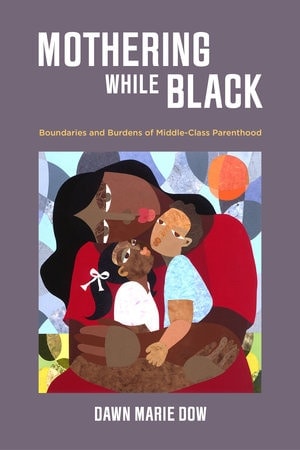 Dawn Marie Dow. 2019. Mothering While Black: Boundaries and Burdens of Middle-Class Parenthood. University of California Press.
Dawn Marie Dow. 2019. Mothering While Black: Boundaries and Burdens of Middle-Class Parenthood. University of California Press.
Mothering While Black examines the complex lives of the African American middle class—in particular, black mothers and the strategies they use to raise their children to maintain class status while simultaneously defining and protecting their children’s “authentically black” identities. Sociologist Dawn Marie Dow shows how the frameworks typically used to research middle-class families focus on white mothers’ experiences, inadequately capturing the experiences of African American middle- and upper-middle-class mothers. These limitations become apparent when Dow considers how these mothers apply different parenting strategies for black boys and for black girls, and how they navigate different expectations about breadwinning and childrearing from the African American community. At the intersection of race, ethnicity, gender, work, family, and culture, Mothering While Black sheds light on the exclusion of African American middle-class mothers from the dominant cultural experience of middle-class motherhood. In doing so, it reveals the painful truth of the decisions that black mothers must make to ensure the safety, well-being, and future prospects of their children.
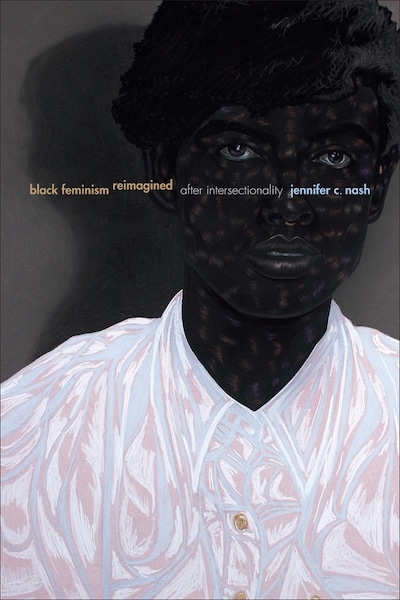 Jennifer C. Nash. 2019. Black Feminism Reimagined: After Intersectionality. Duke University Press.
Jennifer C. Nash. 2019. Black Feminism Reimagined: After Intersectionality. Duke University Press.
In Black Feminism Reimagined Jennifer C. Nash reframes black feminism’s engagement with intersectionality, often celebrated as its primary intellectual and political contribution to feminist theory. Charting the institutional history and contemporary uses of intersectionality in the academy, Nash outlines how women’s studies has both elevated intersectionality to the discipline’s primary program-building initiative and cast intersectionality as a threat to feminism’s coherence. As intersectionality has become a central feminist preoccupation, Nash argues that black feminism has been marked by a single affect—defensiveness—manifested by efforts to police intersectionality’s usages and circulations. Nash contends that only by letting go of this deeply alluring protectionist stance, the desire to make property of knowledge, can black feminists reimagine intellectual production in ways that unleash black feminist theory’s visionary world-making possibilities.
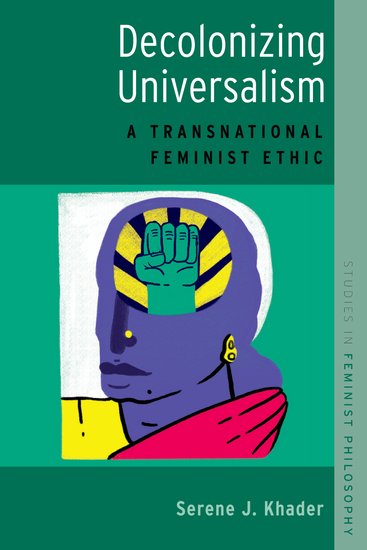 Serene J. Khader. 2018. Decolonizing Universalism: A Transnational Feminist Ethic. Oxford University Press.
Serene J. Khader. 2018. Decolonizing Universalism: A Transnational Feminist Ethic. Oxford University Press.
Decolonizing Universalism argues that feminism can respect cultural and religious differences and acknowledge the legacy of imperialism without surrendering its core ethical commitments. Transcending relativism/ universalism debates that reduce feminism to a Western notion, Serene J. Khader proposes a feminist vision that is sensitive to postcolonial and antiracist concerns. Khader criticizes the false universalism of what she calls ‘Enlightenment liberalism,’ a worldview according to which the West is the one true exemplar of gender justice and moral progress is best achieved through economic independence and the abandonment of tradition. She argues that anti-imperialist feminists must rediscover the normative core of feminism and rethink the role of moral ideals in transnational feminist praxis. What emerges is a nonideal universalism that rejects missionary feminisms that treat Western intervention and the spread of Enlightenment liberalism as the path to global gender injustice.
The book draws on evidence from transnational women’s movements and development practice in addition to arguments from political philosophy and postcolonial and decolonial theory, offering a rich moral vision for twenty-first century feminism.
Allegra review guidelines:
All reviews should be completed within three months of the receipt of the book.
We use British English (i.e. use –ise and not –ize word endings). We encourage clear expression and simple sentence structures especially if English is not your first language.
Word limit: 750-1500 words.
Font: Times New Roman.
Size: 12.
Line Spacing: 1,5
No footnotes.
If you cite other authors, please reference their publication in the end.
When submitting the review, do not forget to include your name, (academic) affiliation (if any), a photograph of yourself and a short bio of 2-3 sentences.
Featured image by Luis Cortes Martinez on Unsplash.com.


